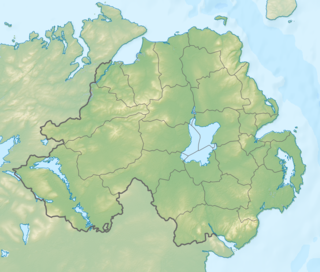Related Research Articles

The Troubles were an ethno-nationalist period of conflict in Northern Ireland that lasted about 30 years from the late 1960s to the late 1990s. Also known internationally as the Northern Ireland conflict, it is sometimes described as an "irregular war" or "low-level war". The conflict began in the late 1960s and is usually deemed to have ended with the Good Friday Agreement of 1998. Although the Troubles mostly took place in Northern Ireland, at times the violence spilled over into parts of the Republic of Ireland, England, and mainland Europe.

The Royal Ulster Constabulary (RUC) was the police force in Northern Ireland from 1922 to 2001. It was founded on 1 June 1922 as a successor to the Royal Irish Constabulary (RIC) following the partition of Ireland. At its peak the force had around 8,500 officers with a further 4,500 who were members of the RUC Reserve.

Whitehead is a small seaside town on the east coast of County Antrim, Northern Ireland, lying almost midway between the towns of Carrickfergus and Larne. It lies within the civil parish of Templecorran, the historic barony of Belfast Lower, and is part of Mid and East Antrim Borough Council. Before the Plantation of Ulster its name was recorded as both Whitehead and Kinbaine.

Ulster loyalism is a strand of Ulster unionism associated with working class Ulster Protestants in Northern Ireland. Like most unionists, loyalists support the continued existence of Northern Ireland within the United Kingdom, and oppose a united Ireland. Unlike other strands of unionism, loyalism has been described as an ethnic nationalism of Ulster Protestants and "a variation of British nationalism". Loyalists are often said to have a conditional loyalty to the British state so long as it defends their interests. They see themselves as loyal primarily to the Protestant British monarchy rather than to British governments and institutions, while Garret FitzGerald argued they are loyal to 'Ulster' over 'the Union'. A small minority of loyalists have called for an independent Ulster Protestant state, believing they cannot rely on British governments to support them. The term 'loyalism' is usually associated with paramilitarism.

Claudy is a village and townland in County Londonderry, Northern Ireland. It lies in the Faughan Valley, 6 miles (9.7 km) southeast of Derry, where the River Glenrandal joins the River Faughan. It is situated in the civil parish of Cumber Upper and the historic barony of Tirkeeran. It is also part of Derry and Strabane district.

Kilmore or Killmore is a small village, townland and civil parish in County Armagh, Northern Ireland. It lies 2.5 miles (4 km) north of Richhill and within the Armagh City, Banbridge and Craigavon Borough Council area. It had a population of 190 people in the 2011 Census.

Jim Lynagh was a member of the East Tyrone Brigade of the Provisional Irish Republican Army (IRA), from Monaghan Town in the Republic of Ireland.
Cappagh is a small village and townland in the parish of Pomeroy in County Tyrone, Northern Ireland. It is between Pomeroy, Ballygawley, Galbally and Carrickmore, with the hamlet of Galbally about one mile to the east. Most of the land around Cappagh is farmland although a quarry lies just outside the village.
The Troubles in Lisnaskea recounts incidents during, and the effects of, The Troubles in Lisnaskea, County Fermanagh, Northern Ireland.
The Troubles in Roslea recounts incidents during, and the effects of, The Troubles in Roslea, County Fermanagh, Northern Ireland.
The Troubles in Newtownabbey recounts incidents during and the effects of the Troubles in Newtownabbey, County Antrim, Northern Ireland.
The Troubles in Loughgall recounts incidents during, and the effects of the Troubles in Loughgall, County Armagh, Northern Ireland.
The Troubles in Annaghmore recounts incidents during, and the effects of, The Troubles in Annaghmore, County Armagh, Northern Ireland.
The Troubles in Rock recounts incidents during, and the effects of, The Troubles in Rock, County Tyrone, Northern Ireland.
The Troubles in Loughmacrory recounts incidents during, and the effects of the Troubles in Loughmacrory, County Tyrone, Northern Ireland.

The Springhill massacre was an incident in which five Catholic residents were killed by the British Army on 9 July 1972 in the Springhill estate in West Belfast, Northern Ireland. Three of the victims were teenagers, two of them with republican paramilitary links; one was a member of the Provisional Irish Republican Army's youth wing and the other was a member of the Official Irish Republican Army’s youth wing. The incident took place during The Troubles.

The 1992 Coalisland riots were a series of clashes on 12 and 17 May 1992 between local Irish nationalist civilians and British Army soldiers in the town of Coalisland, County Tyrone, Northern Ireland. The Third Battalion 1992 tour's codename was "Operation Gypsy".

On 22 August 1972 a bomb planted by the Provisional Irish Republican Army, an Irish republican paramilitary group, detonated prematurely at a customs office in Newry. Three IRA members killed six civilians and themselves in the explosion. The event was one of the bloodiest of 1972, the deadliest year of The Troubles.

The Red Lion Pub bombing was a bomb attack that happened on 2 November 1971 in Belfast, Northern Ireland. Planted by the Provisional IRA's Belfast Brigade, it exploded in the Red Lion pub, killing three people and injuring about 30 others.

On 12 December 1993, a Provisional IRA active service unit of the East Tyrone Brigade ambushed a two-men unmarked mobile patrol of the Royal Ulster Constabulary (RUC) in Fivemiletown, County Tyrone. The two constables in the vehicle were shot and killed instantly. A military helicopter was also fired at by a second IRA unit in the aftermath of the incident, during a search operation launched in the surroundings of the town by both the British Army and the RUC. A number of suspects were questioned, but the perpetrators made good their escape. The action occurred just three days before the Downing Street Declaration.